Module 5 Lao She Teahouse.Unit 3(共22张PPT)
文档属性
| 名称 | Module 5 Lao She Teahouse.Unit 3(共22张PPT) |
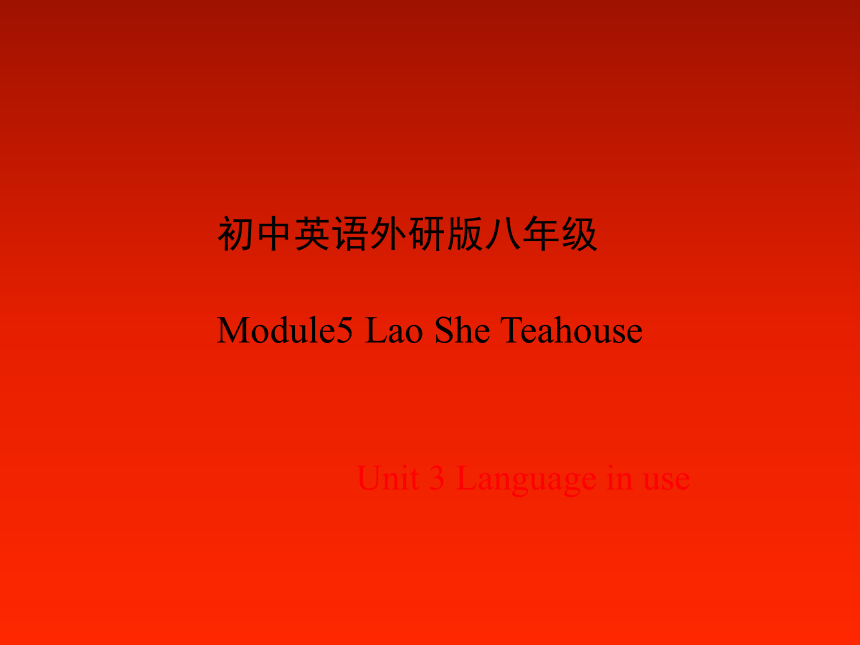
|
|
| 格式 | ppt | ||
| 文件大小 | 2.9MB | ||
| 资源类型 | 教案 | ||
| 版本资源 | 外研版 | ||
| 科目 | 英语 | ||
| 更新时间 | 2022-07-31 10:40:03 | ||
图片预览

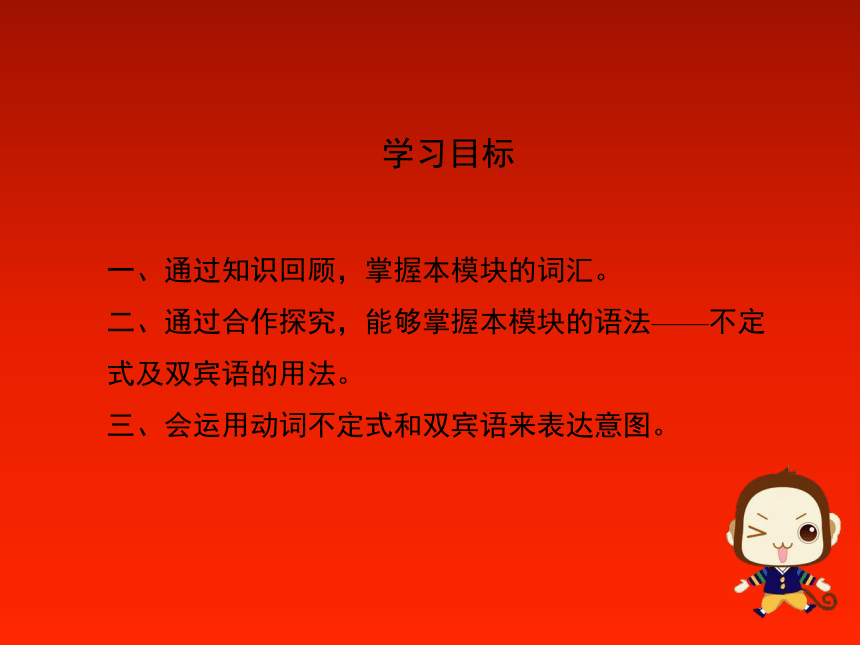
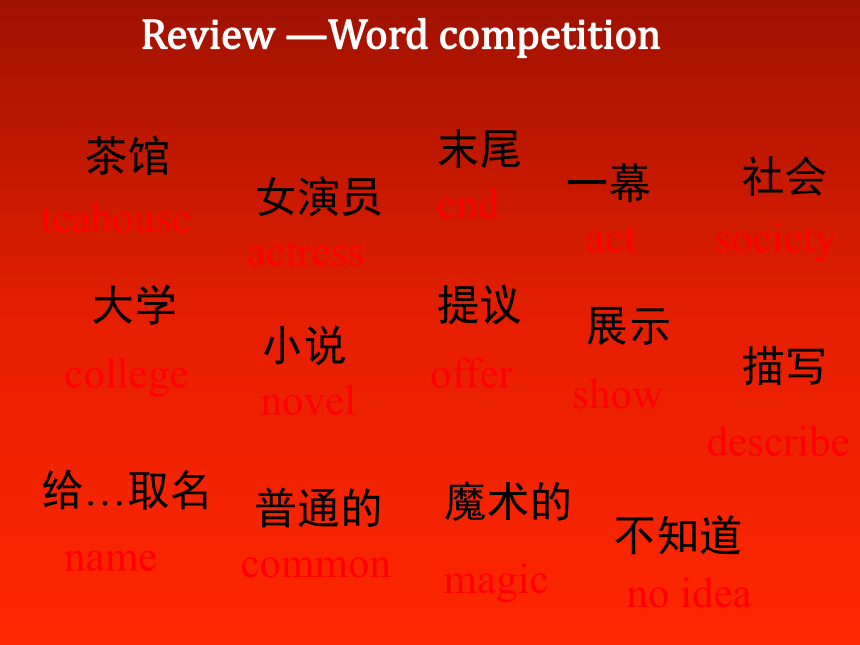
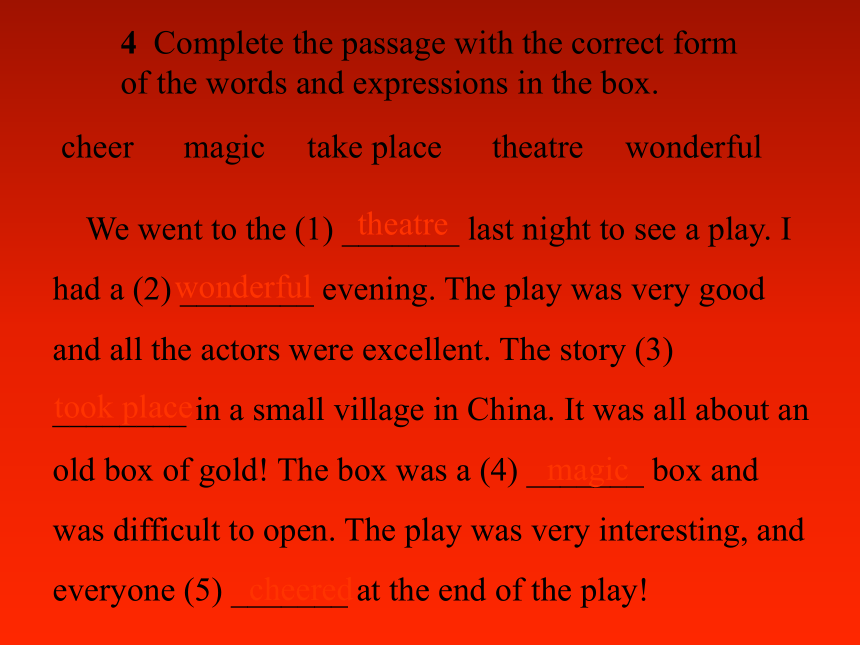
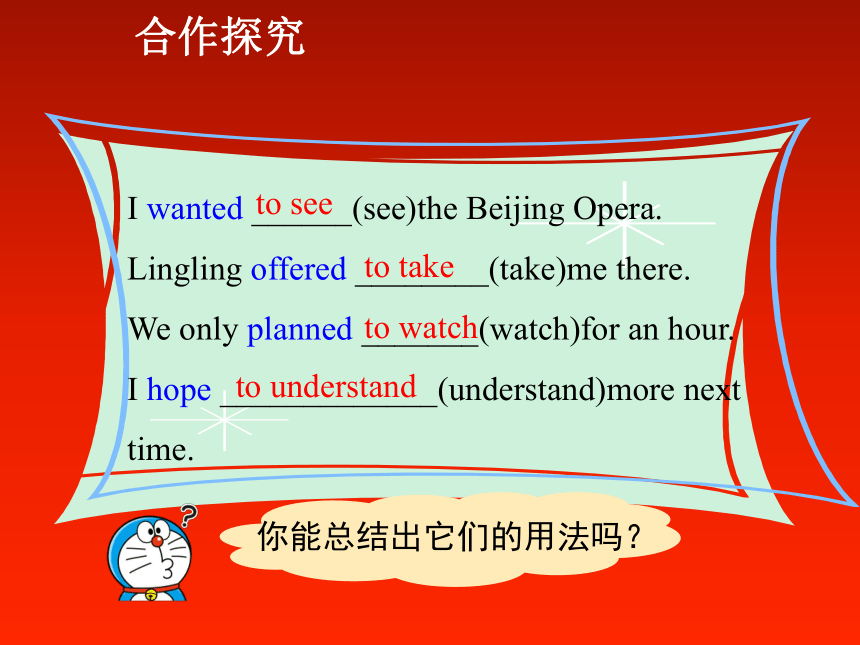
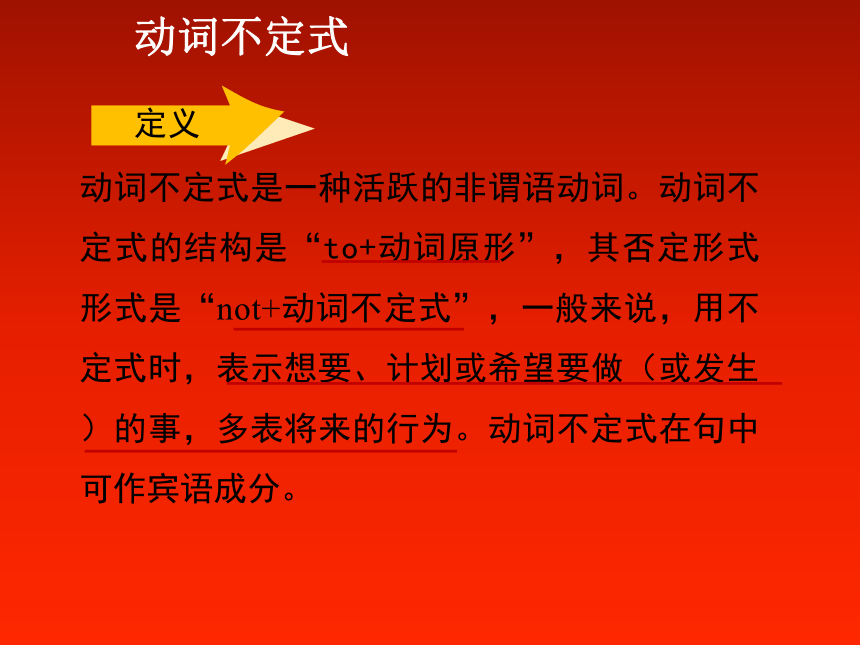
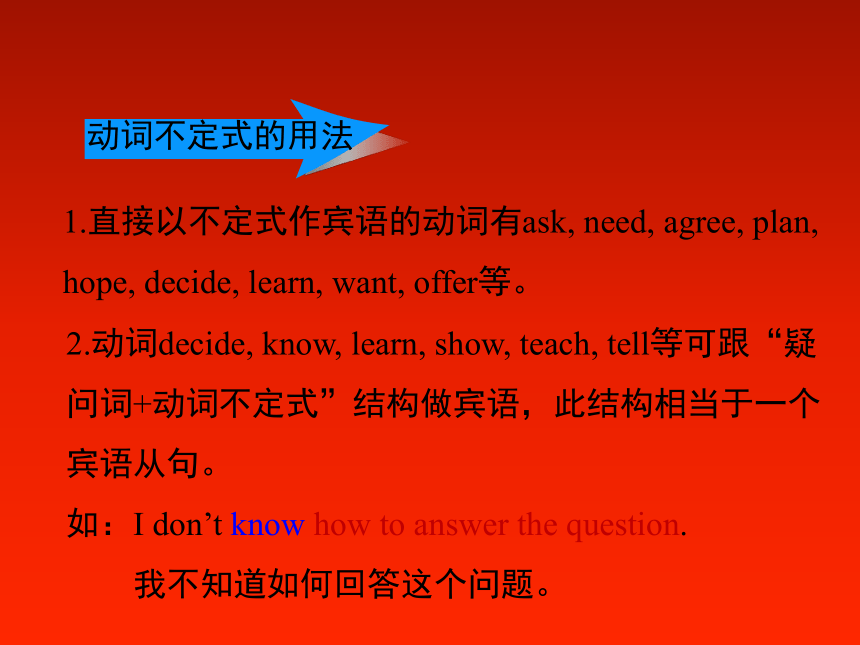
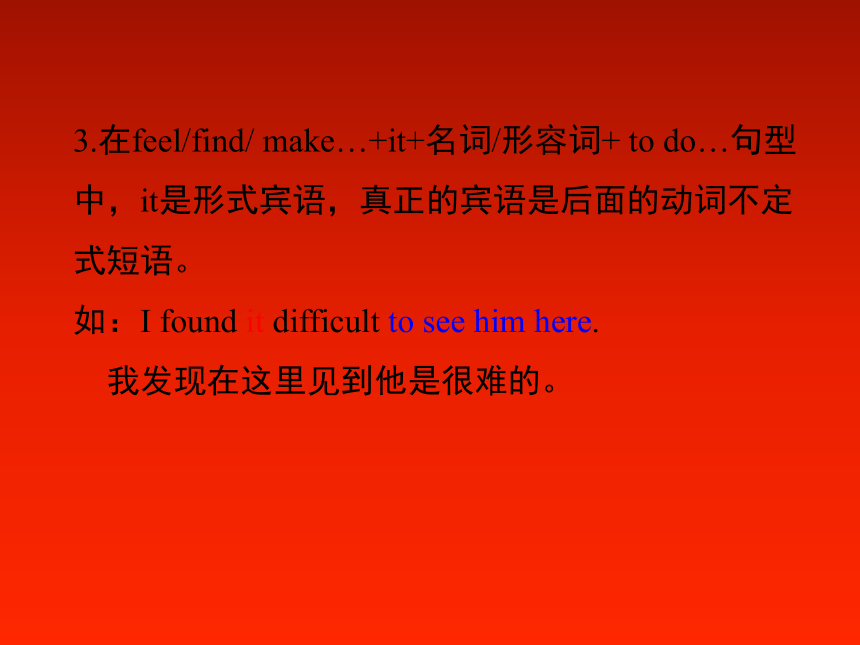
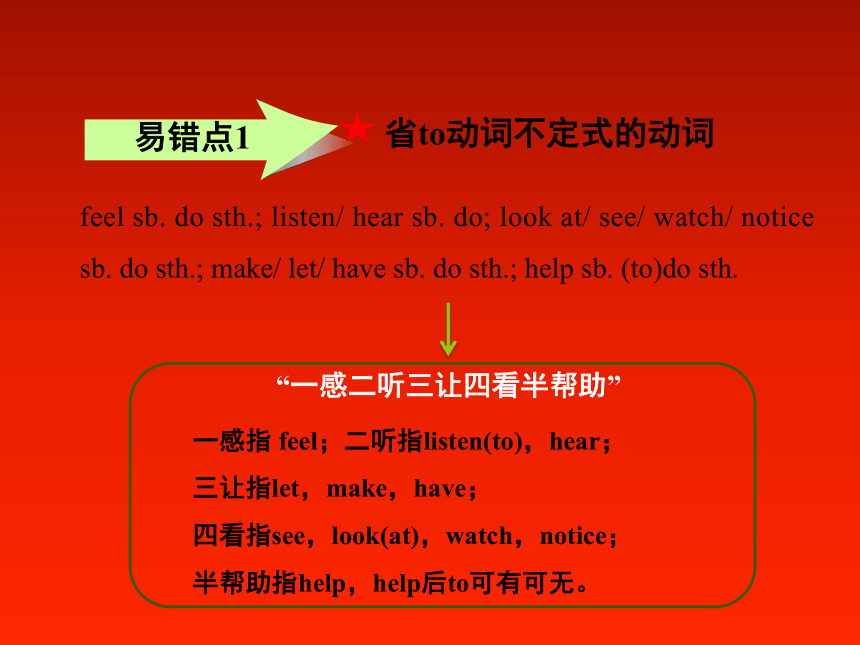
文档简介
(共22张PPT)
Unit 3 Language in use
Module5 Lao She Teahouse
初中英语外研版八年级
学习目标
一、通过知识回顾,掌握本模块的词汇。
二、通过合作探究,能够掌握本模块的语法——不定式及双宾语的用法。
三、会运用动词不定式和双宾语来表达意图。
Review —Word competition
茶馆
teahouse
女演员
actress
末尾
end
一幕
act
社会
society
大学
college
小说
novel
提议
offer
展示
show
描写
describe
给…取名
name
普通的
common
魔术的
magic
不知道
no idea
4 Complete the passage with the correct form of the words and expressions in the box.
We went to the (1) _______ last night to see a play. I had a (2) ________ evening. The play was very good and all the actors were excellent. The story (3) ________ in a small village in China. It was all about an old box of gold! The box was a (4) _______ box and was difficult to open. The play was very interesting, and everyone (5) _______ at the end of the play!
cheer magic take place theatre wonderful
theatre
wonderful
took place
magic
cheered
合作探究
I wanted ______(see)the Beijing Opera.
Lingling offered ________(take)me there.
We only planned _______(watch)for an hour.
I hope _____________(understand)more next time.
你能总结出它们的用法吗?
to see
to take
to watch
to understand
动词不定式
定义
动词不定式是一种活跃的非谓语动词。动词不定式的结构是“to+动词原形”,其否定形式形式是“not+动词不定式”,一般来说,用不定式时,表示想要、计划或希望要做(或发生)的事,多表将来的行为。动词不定式在句中可作宾语成分。
动词不定式的用法
1.直接以不定式作宾语的动词有ask, need, agree, plan, hope, decide, learn, want, offer等。
2.动词decide, know, learn, show, teach, tell等可跟“疑问词+动词不定式”结构做宾语,此结构相当于一个宾语从句。
如:I don’t know how to answer the question.
我不知道如何回答这个问题。
3.在feel/find/ make…+it+名词/形容词+ to do…句型中,it是形式宾语,真正的宾语是后面的动词不定式短语。
如:I found it difficult to see him here.
我发现在这里见到他是很难的。
易错点1
省to动词不定式的动词
“一感二听三让四看半帮助”
feel sb. do sth.; listen/ hear sb. do; look at/ see/ watch/ notice sb. do sth.; make/ let/ have sb. do sth.; help sb. (to)do sth.
一感指 feel;二听指listen(to),hear;
三让指let,make,have;
四看指see,look(at),watch,notice;
半帮助指help,help后to可有可无。
易错点2
既可跟不定式又可跟动名词作宾语,但表达意义完全不同。
高效上好每节课·快乐上好每天学
forget
to do sth. 忘记去做某事(未做)
doing sth. 忘记做过某事(已做)
stop
to do sth. 停下来做另外一件事
doing sth. 停止做某事
类似的还有remember, mean, try等。
I gave him a birthday cake.=I gave a birthday cake to him.
双宾语
英语中,有些动词后可接两个宾语,即指人的间接宾语和指物的直接宾语。结构为“动词+间接宾语(sb.)+直接宾语(sth.)”。有时还可用“动词+直接宾语(sth.) +to/for+间接宾语(sb.)”结构来表达。一般来讲,for表示“为某人”,而to表示“给某人”。
间接宾语
直接宾语
间接宾语
直接宾语
易错点解析
1.若是把直接宾语(sth.) 放在间接宾语(sb.)前面,需要在间接宾语(sb.)前加to的动词有:bring, give, show, pass, lend, take, tell, hand, offer等。
2.若是把直接宾语(sth.) 放在间接宾语(sb.)前面,需要在间接宾语(sb.)前加for的动词有:buy, make, cook, sing, read, get等。
1 Complete the sentences with the correct form of the words in the box.
see spend stay teach write
Do you want to go the teahouse
1. We decided _______ at home because it wasraining.
2. Lao She started ________ Chinese in London in 1924.
3. I tried ________ poems.
4. They plan ______ a film tomorrow.
5. I want ________ my holiday in Beijing.
to stay
to teach
to write
to see
to spend
Betty (1) _______to see the Beijing Opera again. Lingling (2)_______ to take her. Daming (3) _______ them to go to Mei Lanfang Theatre. Lingling (4) ______ to go next Saturday.
2 Read the conversation and complete the note with the correct form of the words in the box.
advise decide offer want
Betty: I’d love to see the Beijing Opera again.
Lingling: Would you like me to take you Where can we go this time
Daming: I know! You can go to Mei Lanfang Theatre.
Lingling: Good idea! Let’s go next Saturday, Betty.
wanted
offered
advised
decided
Why not … 为什么不…呢?
Why don’t you do sth. 你为什么不…?
Would you like to do sth. 你愿意…
You’d better (not) do sth. 你最好(不)做某事。
Let sb. do sth. 让某人做某事。
What/How about doing sth 做某事…?
回答:I’d like to. / I’d like to, but…
That’s a good idea. /Sounds great.
提出建议的句型及回答
hope how about let’s want
why don’t we why not would like
A: I want to see Beijing Opera.
B: Why don’t we ...
7 Talk about your weekend plans. Use the words and expressions from the box to help you.
Pair work
3 Complete the passage with the correct form of the words in brackets.
to help
to be
Lu Xun is one of the greatest writers of modern China. He was born in Shaoxing, Zhejiang Province, in 1881. At first, Lu Xun hoped (1) __________ (help) the Chinese people become healthy and strong, so he decided (2) _______ (be) a doctor. After a few years,
he started (3) _________ (write) short stories because he wanted (4) ________ (teach) people about society. One of his most famous stories is The True Story of Ah Q. It describes the hard life of Ah Q and makes people (5) ______ (think) about society. In the 1920s, people began to translate his works into English.
to help
to be
to write
to teach
think
5 Listen and choose the correct answer.
1. Who is visiting London
a) Vicky b) Steve c) Remoe
2. What are they talking about
a) Romeo and Juliet
b) London
c) Vicky’s parents
1. Steve went to Shakespeare’s Globe Theatre last night.
2. Vicky offered to take Steve to the theatre.
3. Steve did not try to understand the words.
4. Vicky hopes to see her favorite play.
5. Vicky thinks her parents will take her to the theatre.
6 Listen again and check (√) the true sentences.
8 Read the passage and choose the correct answer.
You would find the passage in ______.
a) a book b) a school newspaper c) a magazine
The write_____.
a) liked the play b) did not like the play
c) did not say he liked the play or not
The actors and actresses in the play wore_____.
a) the same clothes as today b) their best clothes
c) clothes of the first half of the twentieth century
Li Nan is ________.
a) a famous actor b) a student c) an actress
Theatres
Western theatre started in Greece, around 600 BC. The theatres were very big. About 15,000 people could watch a play at the same time. The audience sat on stone seats to watch the performances. Some of the theatres survive, as do some of the plays by ancient Greek writers. People still watch these plays today.
Homework
1. Review the grammar in this Module.
2. Memorize words and phrases in this Module.
3. Preview the content of Module6 Unit1.
Unit 3 Language in use
Module5 Lao She Teahouse
初中英语外研版八年级
学习目标
一、通过知识回顾,掌握本模块的词汇。
二、通过合作探究,能够掌握本模块的语法——不定式及双宾语的用法。
三、会运用动词不定式和双宾语来表达意图。
Review —Word competition
茶馆
teahouse
女演员
actress
末尾
end
一幕
act
社会
society
大学
college
小说
novel
提议
offer
展示
show
描写
describe
给…取名
name
普通的
common
魔术的
magic
不知道
no idea
4 Complete the passage with the correct form of the words and expressions in the box.
We went to the (1) _______ last night to see a play. I had a (2) ________ evening. The play was very good and all the actors were excellent. The story (3) ________ in a small village in China. It was all about an old box of gold! The box was a (4) _______ box and was difficult to open. The play was very interesting, and everyone (5) _______ at the end of the play!
cheer magic take place theatre wonderful
theatre
wonderful
took place
magic
cheered
合作探究
I wanted ______(see)the Beijing Opera.
Lingling offered ________(take)me there.
We only planned _______(watch)for an hour.
I hope _____________(understand)more next time.
你能总结出它们的用法吗?
to see
to take
to watch
to understand
动词不定式
定义
动词不定式是一种活跃的非谓语动词。动词不定式的结构是“to+动词原形”,其否定形式形式是“not+动词不定式”,一般来说,用不定式时,表示想要、计划或希望要做(或发生)的事,多表将来的行为。动词不定式在句中可作宾语成分。
动词不定式的用法
1.直接以不定式作宾语的动词有ask, need, agree, plan, hope, decide, learn, want, offer等。
2.动词decide, know, learn, show, teach, tell等可跟“疑问词+动词不定式”结构做宾语,此结构相当于一个宾语从句。
如:I don’t know how to answer the question.
我不知道如何回答这个问题。
3.在feel/find/ make…+it+名词/形容词+ to do…句型中,it是形式宾语,真正的宾语是后面的动词不定式短语。
如:I found it difficult to see him here.
我发现在这里见到他是很难的。
易错点1
省to动词不定式的动词
“一感二听三让四看半帮助”
feel sb. do sth.; listen/ hear sb. do; look at/ see/ watch/ notice sb. do sth.; make/ let/ have sb. do sth.; help sb. (to)do sth.
一感指 feel;二听指listen(to),hear;
三让指let,make,have;
四看指see,look(at),watch,notice;
半帮助指help,help后to可有可无。
易错点2
既可跟不定式又可跟动名词作宾语,但表达意义完全不同。
高效上好每节课·快乐上好每天学
forget
to do sth. 忘记去做某事(未做)
doing sth. 忘记做过某事(已做)
stop
to do sth. 停下来做另外一件事
doing sth. 停止做某事
类似的还有remember, mean, try等。
I gave him a birthday cake.=I gave a birthday cake to him.
双宾语
英语中,有些动词后可接两个宾语,即指人的间接宾语和指物的直接宾语。结构为“动词+间接宾语(sb.)+直接宾语(sth.)”。有时还可用“动词+直接宾语(sth.) +to/for+间接宾语(sb.)”结构来表达。一般来讲,for表示“为某人”,而to表示“给某人”。
间接宾语
直接宾语
间接宾语
直接宾语
易错点解析
1.若是把直接宾语(sth.) 放在间接宾语(sb.)前面,需要在间接宾语(sb.)前加to的动词有:bring, give, show, pass, lend, take, tell, hand, offer等。
2.若是把直接宾语(sth.) 放在间接宾语(sb.)前面,需要在间接宾语(sb.)前加for的动词有:buy, make, cook, sing, read, get等。
1 Complete the sentences with the correct form of the words in the box.
see spend stay teach write
Do you want to go the teahouse
1. We decided _______ at home because it wasraining.
2. Lao She started ________ Chinese in London in 1924.
3. I tried ________ poems.
4. They plan ______ a film tomorrow.
5. I want ________ my holiday in Beijing.
to stay
to teach
to write
to see
to spend
Betty (1) _______to see the Beijing Opera again. Lingling (2)_______ to take her. Daming (3) _______ them to go to Mei Lanfang Theatre. Lingling (4) ______ to go next Saturday.
2 Read the conversation and complete the note with the correct form of the words in the box.
advise decide offer want
Betty: I’d love to see the Beijing Opera again.
Lingling: Would you like me to take you Where can we go this time
Daming: I know! You can go to Mei Lanfang Theatre.
Lingling: Good idea! Let’s go next Saturday, Betty.
wanted
offered
advised
decided
Why not … 为什么不…呢?
Why don’t you do sth. 你为什么不…?
Would you like to do sth. 你愿意…
You’d better (not) do sth. 你最好(不)做某事。
Let sb. do sth. 让某人做某事。
What/How about doing sth 做某事…?
回答:I’d like to. / I’d like to, but…
That’s a good idea. /Sounds great.
提出建议的句型及回答
hope how about let’s want
why don’t we why not would like
A: I want to see Beijing Opera.
B: Why don’t we ...
7 Talk about your weekend plans. Use the words and expressions from the box to help you.
Pair work
3 Complete the passage with the correct form of the words in brackets.
to help
to be
Lu Xun is one of the greatest writers of modern China. He was born in Shaoxing, Zhejiang Province, in 1881. At first, Lu Xun hoped (1) __________ (help) the Chinese people become healthy and strong, so he decided (2) _______ (be) a doctor. After a few years,
he started (3) _________ (write) short stories because he wanted (4) ________ (teach) people about society. One of his most famous stories is The True Story of Ah Q. It describes the hard life of Ah Q and makes people (5) ______ (think) about society. In the 1920s, people began to translate his works into English.
to help
to be
to write
to teach
think
5 Listen and choose the correct answer.
1. Who is visiting London
a) Vicky b) Steve c) Remoe
2. What are they talking about
a) Romeo and Juliet
b) London
c) Vicky’s parents
1. Steve went to Shakespeare’s Globe Theatre last night.
2. Vicky offered to take Steve to the theatre.
3. Steve did not try to understand the words.
4. Vicky hopes to see her favorite play.
5. Vicky thinks her parents will take her to the theatre.
6 Listen again and check (√) the true sentences.
8 Read the passage and choose the correct answer.
You would find the passage in ______.
a) a book b) a school newspaper c) a magazine
The write_____.
a) liked the play b) did not like the play
c) did not say he liked the play or not
The actors and actresses in the play wore_____.
a) the same clothes as today b) their best clothes
c) clothes of the first half of the twentieth century
Li Nan is ________.
a) a famous actor b) a student c) an actress
Theatres
Western theatre started in Greece, around 600 BC. The theatres were very big. About 15,000 people could watch a play at the same time. The audience sat on stone seats to watch the performances. Some of the theatres survive, as do some of the plays by ancient Greek writers. People still watch these plays today.
Homework
1. Review the grammar in this Module.
2. Memorize words and phrases in this Module.
3. Preview the content of Module6 Unit1.
同课章节目录
- Module 1 How to learn English
- Unit 1 Let's try to speak English as much as possi
- Unit 2 You should smile at her.
- Unit 3 Language in use .
- Module 2 My home town and my country
- Unit 1 It's taller than many other buildings.
- Unit 2 Cambridge is a beautiful city in the east o
- Unit 3 Language in use .
- Module 3 Sports.
- Unit 1 Nothing is more exciting than playing tenni
- Unit 2 This year we training more carefully.
- Unit 3 Language in use .
- Module 4 Planes, ships and trains .
- Unit 1 He lives the farthest from school.
- Unit 2 What is the best way to travel.
- Unit 3 Language in use .
- Module 5 Lao She Teahouse.
- Unit 1 I wanted to see the Beijing Opera.
- Unit 2 It descibes the changes in Chinese society.
- Unit 3 Language in use .
- Module 6 Animals in danger.
- Unit 1 It allows people to get closer to them .
- Unit 2 The WWF is working hard to save them all.
- Unit 3 Language in use .
- Revision module A
- Module 7 A famous story
- Unit 1 Alice was sitting with her sister by the ri
- Unit 2 She was thinking about her cat.
- Unit 3 Language in use .
- Module 8 Accidents
- Unit 1 While the car were changing to red, a car s
- Unit 2 I was trying to pick it up when it bite me
- Unit 3 Language in use .
- Module 9 Population
- Unit 1 The population of China is about 1.37 billi
- Unit 2 Arnwick was a city with 200,000 people.
- Unit 3 Language in use .
- Module 10 The weathe
- Unit 1 It might snow.
- Unit 2 The weather is fine all year round.
- Unit 3 Language in use .
- Module 11 Way of life
- Unit 1 In China ,we open a gift later.
- Unit 2 In England, you usually drink tea with milk
- Unit 3 Language in use .
- Module 12 Help
- Unit 1 What should we do before help arrives?
- Unit 2 Stay away from windows and heavy furniture.
- Unit 3 Language in use .
- Revision module B
